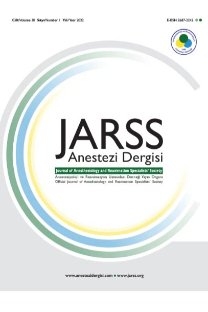Koroner arter bypass cerrahisinde postoperatif serebrovasküler olay ve deliryum için risk faktörlerinin belirlenmesi
Risk factors for postoperative cerebrovascular accident and delirium following coronary artery bypass grafting
___
- 1.Bucerius J, Gummert JF, Borger MA, et al. Stroke after cardiac surgery: a risk factor analysis of 16,184 consecutive adult patients. Ann Thorac Surg 2003; 75: 472-478.
- 2.John R, Choudhri AF, Weinberg AD, et al. Multicenter review of preoperative risk factors for stroke after coronary artery bypass grafting. Ann Thorac Surg 2000; 69: 30-36.
- 3.Orhan G, Sokullu O, Biçer Y ve ark. Koroner arter bypass cerrahisinde tek klemp tekni¤inin inme riski üzerine etkisi. Turkish J Thorac Cardiovasc Surg 2007; 15: 45-50.
- 4.Ülger A, Şahin S, Bahadır FE ve ark. Koroner arter bypass cerrahisi uygulanan hastalarda karotis arter lezyonları ve vertebrobaziler yetmezlik insidanslarının ameliyat sonrası serebrovasküler atak insidansı ile karşılaştırılması. Turkish J Thorac Cardiovasc Surg 2011; 19: 127-137.
- 5.Özatik MA, Göl MK, Fansa . Risk factors for stroke following coronary artery bypass operation. J Card Surg 2005; 20: 52-57.
- 6.Newman MF, Mathew JP, Grocott HP, et al. Central nervous system injury associated with cardiac surgery. Lancet 2006; 368: 694-703.
- 7.McKhann GM, Grega MA, Borowicz LM Jr, et al. Encephalopathy and stroke after coronary artery bypass grafting: incidence, consequences, and prediction. Arch Neurol 2002; 59: 1422-1428.
- 8.Rao V, Christakis GT, Weisel RD, et al. Risk factors for stroke fol- lowing coronary bypass surgery. J Card Surg 1995; 10: 468-474.
- 9.Roach GW, Kanchuger M, Mangano CM, et al. Adverse cerebral outcomes after coronary bypass surgery. N Engl J Med 1996; 335: 1857-1863.
- 10. Stamou SC, Hill PC, Dangas G, et al. Stroke after coronary artery bypass incidence, predictors, and clinical outcome. Stroke 2001; 32: 1508-1513.
- 11. Diegeler A, Hirsch R, Schneider F, et al. Neuromonitoring and neurocognitive outcome in off-pump versus conventional coronary bypass operations. Ann Thorac Surg 2000; 69: 1162-1166.
- 12. Edmunds LH Jr, Clark RE, Cohn LE, Grunkemeier GL, Miller DC, Weisel RD. Guidelines for reporting morbidity and mortality after cardiac valvular operations. J Thorac Cardiovasc Surg 1996; 112: 708-711.
- 13. Miyazaki S, Yoshitani K, Miura N, et al. Risk factors of stroke and delirium after off-pump coronary artery bypass surgery. Interact CardioVasc Thorac Surg 2011; 12: 379-383.
- 14. Mackinnon AD, Aaslid R, Markus HS. Ambulatory transcranial Doppler cerebral embolic signal detection in symptomatic and asymptomatic carotid stenosis. Stroke 2005; 36: 1726-1730.
- 15. Naylor RA, Mehta Z, Rothwell PM, et al. A systematic review of outcomes following staged and synchronous carotid endarterectomy and coronary artery bypass. Eur J Endovasc Surg 2003; 25: 380-389.
- 16. Borger MA, Ivanov J, Weisel RD, Rao V, Peniston CM. Stroke during coronary bypass surgery: principal role of cerebral macroemboli. Eur J Cardiothorac Surg 2001; 19: 627-632.
- 17. Rorich MB, Furlan AJ. Risk at cardiac surgery in patients with pri- or stroke. Neurology 1990; 40: 835-837.
- 18. Shroyer AL, Grover ş, Hattler B, et al. On-pump versus off-pump coronary artery bypass surgery. N Engl J Med 2009; 361: 1827- 1837.
- 19. Sedrakyan A, Wu AW, Parashar A, Bass EB, Treasure T. Off-Pump surgery is associated with reduced occurrence of stroke and other morbidity as compared with traditional coronary artery bypass grafting. A Meta-Analysis of systematically reviewed trials. Stroke 2006; 37: 2759-2769.
- 20. Dabrowski W, Rzecki Z, Pilat J, Czajkowski M. Brain damage in cardiac surgery patients. Curr Opin Pharmacol 2012; 12: 189-194.
- 21. Karmarkar SW, Bottum KM, Tischkau SA. Considerations for the use of anesthetics in neurotoxicity studies. Comp Med 2010; 60: 256-262.
- ISSN: 1300-0578
- Yayın Aralığı: 4
- Başlangıç: 1993
- Yayıncı: Betül Kartal
Karaciğer sirozu nedeniyle takip edilen hastada aort ve mitral kapak replasmanında anestezi yönetimi
Aynur CAMKIRAN, COŞKUN ARAZ, Arash PİRAT, Atilla SEZGİN, Elif A. AKPEK, Gülnaz ARSLAN
ÖZLEM SAĞIR, Ayşe Neslihan BALKAYA, Sabri ÖZASLAN, İsmail ARSLAN, Yücel MERİÇ, Ahmet KÖROĞLU, Ümit İNCEBOZ
Nevriye SALMAN, Ahmet Barış DURUKAN, Hasan Alper GÜRBÜZ, Halil İbrahim UÇAR, Cem YORGANCIOĞLU
Anesteziyoloji ve dahiliye asistanlarındaki iş stresi ve tükenmişlik durumu
Şennur UZUN, Bilge KARACAOĞLU, Seda Banu AKINCI, İ. Aydın ERDEN, Fatma SARICAOĞLU, Ülkü AYPAR
Obez gebelerde anestezi yönetimi
Bilge ÇATALOĞLU ŞENTÜRK, AYTEN SARAÇOĞLU
Obez gebelerde anestezi yönetimi ile ilgili derleme üzerine:
Porfirili bir gebede sezaryen operasyonunda Epidural anestezi
İsmet TOPÇU, Canan UYSAL, Tülün ÖZTÜRK
Alev ŞAYLAN, Özgür CANBAY, Nalan ÇELEBİ, Saadet ÖZGEN
Renin anjiyotensin blokajı yapılan hastalarda hangi intravenöz indüksiyon ajanı?
Reyhan ŞAHİN, MEHMET İLKE BÜGET, AHMET KEMALETTİN KOLTKA, Zerrin ÜLKE SUNGUR, TÜLAY ÖZKAN SEYHAN, Ayşe YAVRU, Emre ÇAMCI
Osman KARAKUŞ, Faik Emre ÜSTÜN, CENGİZ KAYA, ELİF BENGİ ŞENER, Fatih ÖZKAN, ERSİN KÖKSAL, YASEMİN BURCU ÜSTÜN
